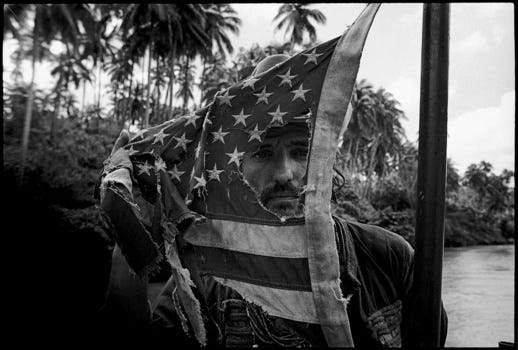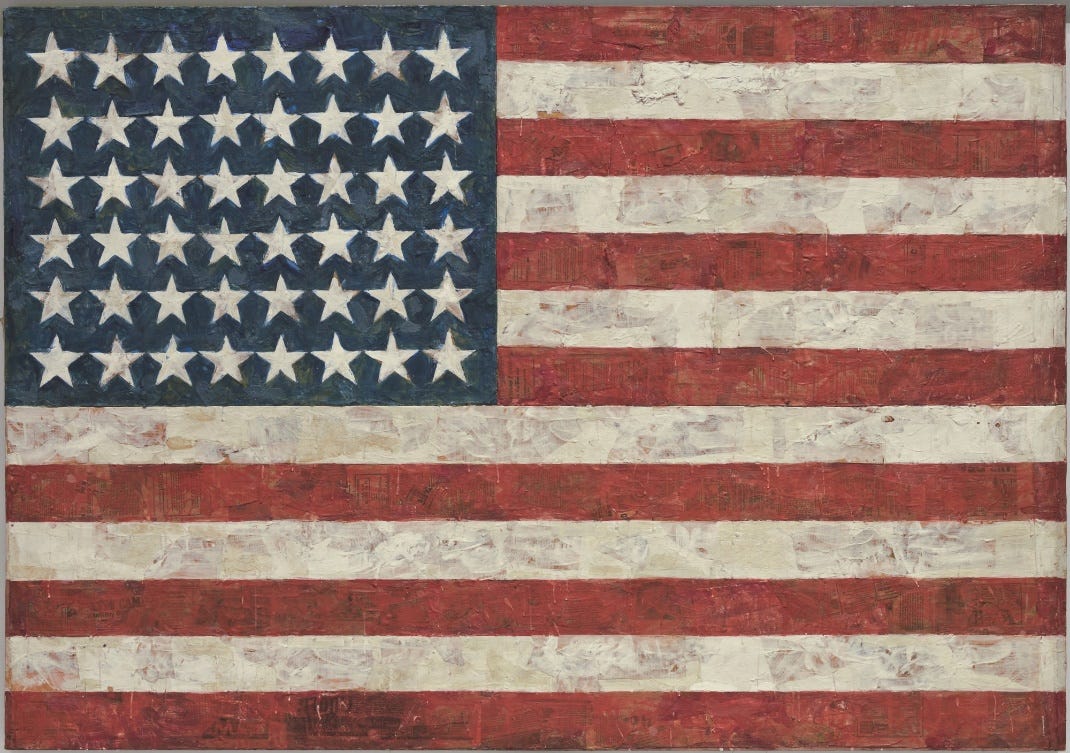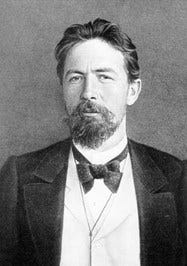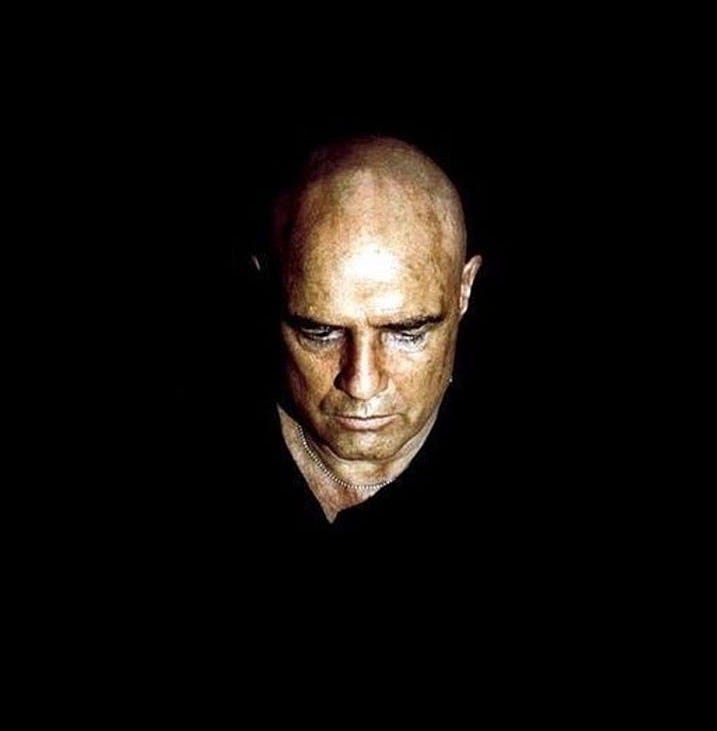Shine, Perishing Republic
A History Lesson & Ode to Flag Day
That flag is a symbol we attach our emotions to, but it isn't the emotion itself and it isn't the thing we really care about. Sometimes we don't even realize what we really care about, because we get so distracted by the symbols. — Tom Wolfe1
or, in the alternative (both by Jasper Johns):
I am not a flag waving “patriot.” Not by any means. Indeed, I am instinctively and intuitively suspicious and wary of any jingoism, nationalism, or over-enthusiastic, aggressive “team spirit” kind of thing. When I see the crowd waving flags (etc.), I immediately head in the opposite direction — as far and fast as I can hustle . . . Always have, always will. I’m with Chekov when he says (in an oft quoted letter to a friend in 1888):
I am not a liberal, not a conservative, not a believer in gradual progress, not a monk, not an indifferentist. I should like to be a free artist and nothing more; and I regret that God has not given me the power to be one. I hate lying and violence in all its forms . . . . I regard trade-marks and labels as superstitions. My holy of holies is the human body, health, intelligence, talent, inspiration, love, and the most absolute freedom — freedom from violence and lying, whatever form they may take. This is the program I would follow if I were a great artist.
This makes me think of one of my favorite films: “Easy Rider” (1969).2
There’s pivotal scene, toward the end of the movie, where they (Fonda, Hopper, & Nicholson) are lying around a camp-fire in the woods in the Deep South, probably somewhere in East Texas or Louisiana. Smoking’ dope, talking story, peacefully. Fonda says nothing; but he’s listening carefully and intently, smiling reflectively. He seems optimistic (how foolish & naive). Nevertheless, it’s a beautiful moment, even though they had been run out of town earlier that day by a bunch of ugly, aggressive Redneck White Trash (flag waving, for sure — the kind of degenerates that vote for Nixon and Trump) who made it very clear that these Hippie Beatniks aren’t welcome in their podunk “All-American” hick town — in spite of the fact that the girls at the soda fountain thought different. Nicholson cogitates critically, incisively, humorously on what this country has become — in the wake of the JFK, MLK, RFK (lest we forget the many others: e.g., Malcolm X et al.), assassinations, not to mention the Vietnam War, Race Riots, Ecocide, Carpet Bombing of Laos & Cambodia (war crimes), Altamount (hadn't happened yet — but it would/did),3 etc. He’s a lawyer, after all, and he waxes eloquently about “freedom”: what it means and represents to so-called “Americans.” He makes a strong case . . . Barlow got it right:
You pay for being free, I'll tell ya freedom don't come easy,
Free don't always come for free . . . Flight of the seabirds, scattered like lost words, wheel to the storm and fly . . . 4
JPB at the kitchen table of the Bar-Cross: Cora, Wyoming (circa 1978)
Anyway, watch, listen, and learn:
They paid all right. As it turns out: IN FULL. The Man always collects on the bill.5 It’s an ominous, bittersweet scene: prescient and foreboding. Those Redneck Deplorables caught (snuck) up on the boys in the woods (as they slept peacefully) and got their revenge (the question is: for what?). I’ll tell you what: resentment, jealousy, fear, and just plain old All-American Cornpone Stupidity. Take that to the bank. It weren’t no accident — anymore than when they whacked JFK at high noon (almost: 12:30 p.m. Central Standard Time) in broad daylight on Main (actually Elm) Street right in from of everyone (Prime Time!); blew Jack’s brains out all over the trunk (but the “shot came from behind?” . . . Yeah, sure it did, whatever you say, Dulles:6 the evidence shows otherwise — “back and to the left . . . back and to the left”):
Notice all the Flags waving . . . and so it goes. “Death don’t have no mercy in this land.”7 Yep, sure don’t. That one really hurt — US ALL. Still does and always will:
It feels as if the arrow is still embedded —and the wound
cannot ever be healed. When he moves, walking or galloping,
he has the sensation of it dangling from his chest, its shaft
a little bit longer than the distance between chest and ground
so it drags and catches, causing the point to stir in his heart
and release more gusts of pain. He found no antidote to the
poison the arrow was dipped in. Searching and intimate, it
crawls and flashes around his body at all times . . . The wound
has become his laboratory.- Elizabeth Cook, “Achilles”
“Free don’t come for free.” Yep. Never did; never will. Be careful what you wish (or shoot) for . . . “Freedom’s just another word when you got nothin’ left to lose”:
One of our best American poets, Robinson Jeffers offers this for our collective contemplation:
While this America settles in the mould of its vulgarity, heavily thickening to empire,
And protest, only a bubble in the molten mass, pops and sighs out, and the mass hardens,
I sadly smiling remember that the flower fades to make fruit, the fruit rots to make earth.
Out of the mother; and through the spring exultances, ripeness and decadence; and home to the mother.
You making haste haste on decay: not blameworthy; life is good, be it stubbornly long or suddenly
A mortal splendor: meteors are not needed less than mountains: shine, perishing republic.
But for my children, I would have them keep their distance from the thickening center; corruption
Never has been compulsory, when the cities lie at the monster's feet there are left the mountains.
And boys, be in nothing so moderate as in love of man, a clever servant, insufferable master.There is the trap that catches noblest spirits, that caught—they say—God, when he walked on earth.8
Happy Flag Day!
Huelo Hale Paumalu 2021
Credit goes to my old friend Seth Tichenor for prompting me to this issue today. Mahalo Nui Loa, Professor!
Year I was born.
Cf. The incomparable documentary: “Gimme Shelter” directed by Albert and David Maysles and Charlotte Zwerin (1970). SEE: https://pitchfork.com/thepitch/rolling-stones-tour-film-gimme-shelter-is-a-classic-rock-doc-with-no-easy-answers/
“Cassidy,” words by John Perry Barlow; Music by Bob Weir (1974).
Cf. “Apocalypse Now” (1979):
Kurtz : Did they say why, Willard, why they want to terminate my command?
Willard : I was sent on a classified mission, sir.
Kurtz : It's no longer classified, is it? Did they tell you?
Willard : They told me that you had gone totally insane, and that your methods were unsound.
Kurtz : Are my methods unsound?
Willard : I don't see any method at all, sir.
Kurtz : I expected someone like you. What did you expect? Are you an assassin?
Willard : I'm a soldier.
Kurtz : You're neither. You're an errand boy, sent by grocery clerks, to collect a bill.
Cf. Over the final months of the JFK presidency, a clear consensus took shape within the America’s deep state: Kennedy was a national security threat. For the good of the country, he must be removed. And [Allen] Dulles [former head of CIA whom Kennedy had fired in the wake of the “Bay of Pigs” debacle] was the only man with the stature, the connections, and decisive will to make something of this enormity happen . . . All his establishment colleagues had to do was look the other way — as they always did when Dulles took executive action . . . And if the assassination of President Kennedy was indeed an “establishment crime,” as University of Pittsburgh sociology professor David Gibson has suggested, there is even more reason to see the official investigation [i.e., “The Warren Commission”] as an establishment cover-up . . . The attorney general’s suspicions about the death of his brother immediately fell not just on the Mafia, but on the CIA — the agency that, as Bobby knew, had been using the mob to do some of its dirtiest work. Robert Kennedy was not the only one in Washington who immediately sensed a conspiracy behind the killing of his brother . . . Suspicions of conspiracy were particularly strong in France, where President de Gaulle himself had been the target of CIA machinations and survived a barrage of gunfire on his own limousine. After returning from Kennedy’s November 24 funeral in Washington, de Gaulle gave a remarkably candid assessment of the assassination to his information minister, Alain Peyrefitte. “What happened to Kennedy is what nearly happened to me,” confided the French president. “His story is the same as mine . . . It looks like a cowboy story, but it’s only an OAS [Secret Army Organization] story. The security forces were in cahoots with the extremists.” . . . Bobby had frenetically chased every lead he could think of, quickly concluding that JFK was the victim of a plot that had spun out of the CIA’s anti-Castro operation. But after this initial burst of clarity, Bobby soon sank into a fog of despair, unable to develop a clear plan of action . . . because there was not clear way to respond. “The Devil’s Chessboard: Allen Dulles, the CIA, and the Rise of America’s Secret Government,” David Talbot (2015) pp. 561, 565-567, 606.
Cf. The Reverend Gary Davis:
Y'know death don't have no mercy in this land
Death don't have no mercy in this land, in this land
Come to your house, you know he don't take long
Look in bed this morning, children find your mother gone.I said death don't have no mercy in this land.
Death will leave you standing and crying in this land,
Death will leave you standing and crying in this land, in this land, yeah!Whoa! come to your house, why' know he don't stay long,
Why' look in bed this morning,
Children you find that your brothers and sisters are gone.
I said death don't have no mercy in this land.Death will go in any family in this land.
Death will go in any family in this land.
Come to your house, you know he don't take long.
Look in the bed on the morning, children find that your family's gone.I said death don't have no mercy in this land.
Death will leave you standing and crying in this land,
In this land. whoa! come to your house,
Why' know it don't stay long, why' look in bed this morning,
Children find that your brothers and sisters are gone.I said death don't, death don't have no mercy in this land.
“Shine, Perishing Republic” (1925).










